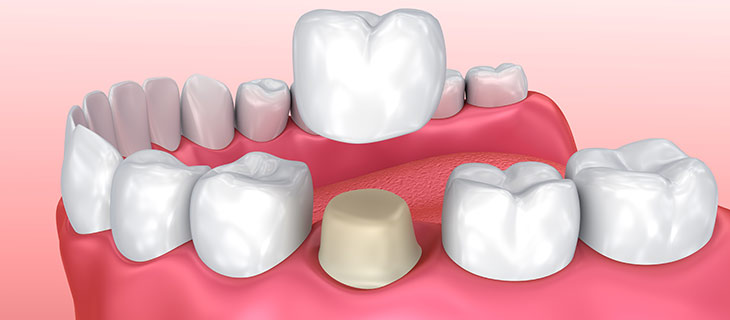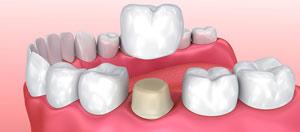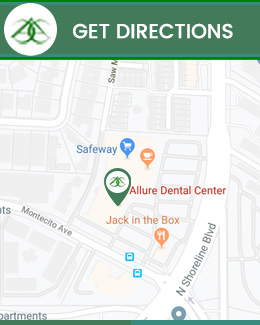Everything You Need to Know About Getting a Dental Crown
A dental crown is a tooth-shaped cap that restores a decayed, broken, weak, or worn-down tooth. Our board-certified Dr. Trinh Lee and Dr. Suzanna Lee provide comprehensive and specialized diagnosis and treatment. Visit Allure Dental Center to learn more. For more information, contact us or schedule an online appointment. We are conveniently located at 570 N Shoreline Blvd Mountain View, CA 94043.




Table of Contents:
What are the different types of dental crowns?
Who needs a dental crown?
How long does a tooth crown last?
How much does a crown cost per tooth?
How do you know when a crown needs to be replaced?
What should first-time patients know about getting a dental crown from Dr. Trinh Lee and Dr. Suzanna Lee?
Dental crowns are custom-made restorations designed to cover and protect damaged or weakened teeth. They are available in several materials, each offering unique advantages based on specific needs. Metal crowns, including gold and other alloys, are known for their exceptional durability and long-lasting performance, making them a preferred choice for back teeth. Porcelain-fused-to-metal crowns combine the strength of metal with the natural appearance of porcelain, making them ideal for teeth that require both durability and aesthetic appeal. For those seeking the most natural look, all-ceramic or all-porcelain crowns are perfect as they provide the best color match to surrounding teeth and are often recommended for people with metal allergies. However, resin crowns, while more affordable, tend to wear down over time and are more prone to fractures. The choice of material depends on the patient’s oral needs, preferences, and the dentist’s recommendation.
Crowns are primarily used to restore functionality and improve the appearance of teeth that are decayed, cracked, or weakened. For visible teeth, porcelain crowns are often used because of their natural look, although they may not be as durable as metal options. Zirconia crowns are becoming increasingly popular due to their strength and aesthetic qualities, making them suitable for both front and back teeth. Each type of crown has distinct benefits, and the best material for your treatment will depend on the tooth’s location, the extent of damage, and your specific needs.
Dental crowns are a highly effective solution for individuals with teeth that are weakened or damaged. If a tooth has extensive decay or has received a large filling, a crown can help protect it from further deterioration, preventing potential fractures or breakage. People with cracked, chipped, or severely worn teeth often need crowns to restore both function and appearance, ensuring that the tooth can withstand normal chewing forces. Crowns are also frequently required after a root canal procedure to provide protection and support for the treated tooth, which may have become brittle or fragile.
In addition to restoring function, crowns can serve a cosmetic purpose. They are commonly used to improve the shape, size, or alignment of teeth that are misaligned or misshapen, offering a more aesthetically pleasing smile. Crowns are also ideal for individuals who have teeth with significant discoloration or staining that can’t be effectively treated with whitening treatments. People with large cavities that cannot be repaired with a traditional filling will often require a crown to prevent further decay or damage. Ultimately, crowns offer a comprehensive solution for enhancing both the functionality and appearance of damaged or compromised teeth. It is essential to consult with a dentist to evaluate your specific needs and determine if a crown is the best option for your oral health.
The longevity of a dental crown is influenced by a variety of factors, including the material used, the quality of oral hygiene practices, and individual lifestyle choices. Generally, dental crowns can last anywhere from 5 to 15 years, depending on how well they are cared for. Metal crowns, such as those made from gold or other strong alloys, tend to have the longest lifespan, often exceeding 15 years due to their durability and resistance to wear. These crowns are particularly well-suited for back teeth, where strength is a priority.
Porcelain-fused-to-metal crowns and all-ceramic crowns are also popular choices, offering both strength and aesthetics. When properly maintained, these crowns typically last between 10 to 15 years. However, their longevity can be reduced if the patient experiences habits such as grinding or clenching teeth. Maintaining a rigorous oral care routine—brushing at least twice daily, flossing regularly, and using mouthwash—can help preserve the crown’s integrity. Avoiding overly hard foods, using a nightguard to prevent tooth grinding, and scheduling regular dental check-ups for professional cleaning and monitoring will further enhance the longevity of the crown. Ultimately, while the material plays a significant role in how long a crown lasts, consistent dental care and mindful habits are essential for maximizing its lifespan.
The cost of a dental crown can vary significantly depending on factors such as the material chosen, the complexity of the procedure, and the geographic location of the dental practice. Generally, metal crowns, such as those made from gold or other durable alloys, tend to be the most expensive option due to their strength and longevity. These crowns can be priced higher than porcelain-fused-to-metal crowns, which offer a balance of durability and aesthetics. All-ceramic and porcelain crowns, which are typically used for visible teeth, tend to be more affordable but still offer excellent aesthetic results. Prices for dental crowns typically range from $800 to $2,500 or more, depending on the material and the specific dental office’s pricing structure.
It’s important to consider that if a dental crown is needed for functional reasons, such as after a root canal or to protect a weakened tooth—your dental insurance may cover a portion of the cost. However, it’s essential to keep in mind that additional procedures, like root canals, tooth extractions, or other necessary treatments before the crown is placed, will add to the overall expense. To fully understand the cost of a dental crown, it’s best to consult with your dental care provider, who can give you an accurate estimate based on your individual needs and the treatment plan required.
Recognizing when a dental crown needs to be replaced depends on the symptoms you experience. Pain or discomfort around the crown can often be a sign that it is worn out or damaged. If you notice any changes in how your bite feels, or if the crown feels loose or misaligned, it could indicate that the crown is no longer functioning properly. In cases where the crown falls off, it’s essential to visit your dentist immediately to prevent further damage to the underlying tooth. Additional signs that a crown may need replacement include visible chips, cracks, or a dark line appearing along the edge of the crown.
Regular check-ups with your dentist are crucial in spotting issues early and avoiding more severe complications later. At Allure Dental Center, our professionals are committed to monitoring your dental health and ensuring your crowns are in good condition. If you suspect your crown may need replacement or if you notice any changes in its fit or function, don’t hesitate to contact us. Our experienced team is here to provide the necessary care and guidance to maintain your smile.
If you’re getting a dental crown for the first time, Dr. Trinh Lee and Dr. Suzanna Lee at Allure Dental Center in Mountain View, CA make the process easy, comfortable, and stress-free. A dental crown is a strong, custom-made cap that fits over a damaged or weakened tooth to protect it and restore its shape, strength, and appearance.
At Allure Dental Center, the process starts with a gentle exam and digital scan—no messy impressions. The doctors will remove any decay or old filling and reshape the tooth to fit the crown. A temporary crown is placed while your final crown is made. In some cases, same-day crowns may be available using advanced in-office technology.
Crowns can be made from porcelain, ceramic, or zirconia, all chosen for strength and a natural look. Once ready, your permanent crown is cemented in place and checked for fit and bite. For more information, contact us or schedule an online appointment. We are conveniently located at 570 N Shoreline Blvd Mountain View, CA 94043. We serve patients from Dallas TX, Plano TX, Addison TX, Garland TX, Richardson TX, Carrollton TX, and surrounding areas.




